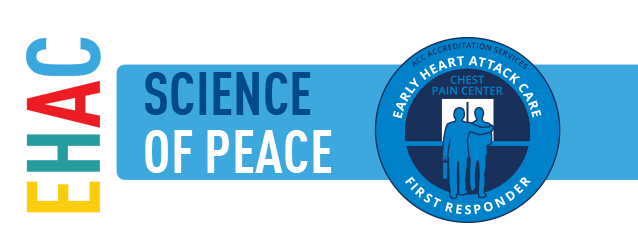EHAC
Articles

Inspiration on a Mission: The Science of Peace Lecture
Dr. Ray Bahr is more than just the Founder of ACC Accreditation Services. His Early Heart Attack Care program is a benchmark of community outreach and education for heart disease.
This article was originally published in 2015. Please note that due to the historical information included, this article has not been updated to reflect the business name ACC Accreditation Services, formerly Society of Cardiovascular Patient Care (SCPC). This article has been updated to reflect EHAC Pledge numbers as of March 2018.
Missing a chance to save a life greatly impacted my life and became the foundation for both the Society and Early Heart Attack Care. But, greater men came before me, men who believed that poverty should not create limits on healthcare. I'm speaking of Dr. Paul Dudley White and Dr. Rene Favalaro.
Before his tragic death in 2000, my friend Dr. Favalaro delivered a speech that became known as the Science of Peace Lecture. In this speech, he outlined the basic ideals of Dr. White's approach to practicing medicine and gave examples of how medical treatment should not lose its focus. "The greatest challenge is to guarantee access to the basics of healthcare for everybody according to the tenets of the Hippocratic Oath," stated Dr. Favalaro.
As many of you know, Dr. Favalaro was scheduled to give an update on his initial message at the Society's 4th annual Congress when he unexpectedly died.
Dr. Favalaro's message was so simple, yet so profound: Poverty creates a global healthcare crisis because the same diseases—including cardiovascular—affect poor people across geographical boundaries.
After his death, I worked with the InterAmerican Heart Foundation in order to continue his work and preserve the mission of the Science of Peace Lecture Series. The Series recognizes a leader who sees social injustice and poverty as the root of diseases that could otherwise be treated if everyone had access to healthcare and education. This event, which occurs every other year, is sponsored in part by the Society, and I offer my greatest thanks to Wil Mick, SCPC's CEO, and our Board of Directors for their continued support. I must also thank my wonderful partner, Beatriz Champagne, PhD, Executive Director of the InterAmerican Heart Foundation, for her dedication and tireless work on the Series.
On October 19, the Series continued as Dr. Michelle Bachelet received the sixth Science of Peace Award for her dedication and commitment to reduce non-communicable chronic diseases through the implementation of health policies. Dr. Bachelet was the President of Chile as well as the Minister of Health of Chile, and she is again running for the office of Chile's President.
Although she has held positions of great importance, Dr. Bachelet stated, "I wanted to talk to you from my position as a doctor and a public health worker for many years. And I am doing it from the deep conviction that has stayed with me throughout my professional and political development: In order for a country to develop, it should boast a strong public health foundation. And so that there are no ambiguities, I understand development as the way of overcoming the enormous underlying inequality in my country and in many countries in the region; this huge obstacle hinders benefits of progress from reaching everyone." Her words are directed at health issues in Chile, but she could be speaking about any country, including the USA.
Dr. Bachelet then spoke words that resonated within my soul, "On a journey that hasn't been without frustrations…"
Who amongst us didn't enter healthcare in order to help save a life or strive to give someone a better way of living? Notice the difference in these words. However, following this path is not without frustration, because we can do everything we possibly can, but we obviously don't have the ability to wave a magic wand and cure poverty and everything else that ails the world.
Believe me, I have been frustrated and it has taken years to get where we are. However, I look at the struggles that Dr. White and Dr. Favalaro faced within their lives and, using this as inspiration, I refuse to give up. In his speech, Dr. Favalaro described one of Dr. White's greatest attributes when he stated, "Optimism is a positive attitude towards life. We know that clinically there are definite effects from the application of this idea. It is quite certain that biological effects also result from cheerfulness, optimism, courage and joy. A chance to counteract the effects of pain, sorrow and anger is possible through the inculcation of a happy disposition." Although he was applying optimism to the medical profession, his words should remind us all of the power of positive belief in our mission.
I believe that each person who spreads EHAC education is doing his or her part to save a life. I believe that if each of our one million EHAC pledges sees the signs and saves just one life, we can drastically reduce the 800,000 annual heart attack deaths. I believe that if we spread our education beyond socio-economic borders, we can reach people who simply don't understand that a heart attack can be prevented.
I Believe.